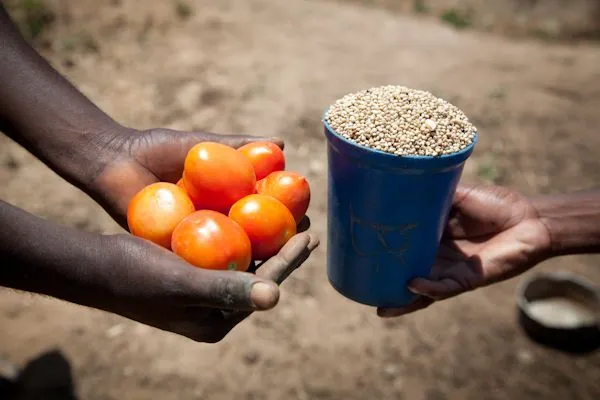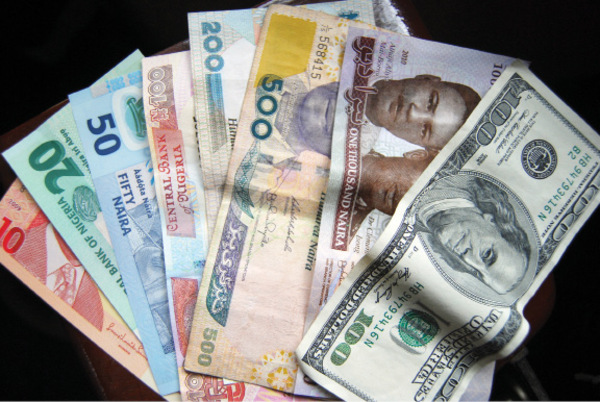Nigerians Resort To Trade By Barter, Foreign Currency To Survive
Residents of border communities in states including Sokoto, Zamfara, Katsina, Adamawa and Kwara have opted for the CFA franc following the scarcity of the new naira notes across the country.
In the north, the residents, including traders and commercial drivers, are also rejecting the old naira notes, insisting that customers who do not have the new redesigned currency must pay for goods and services with CFAs.
The CFA franc is the legal tender in eight West African countries of Benin, Burkina Faso, Côte d’Ivoire, Guinea-Bissau, Mali, Niger, Senegal and Togo, which make up the West African Economic and Monetary Union, otherwise known as the Union Économique et Monétaire Ouest Africaine.
Findings indicated that businessmen and traders in the Zurmi and Shinkafi local government areas of Zamfara State, which border the Niger Republic, prefer the franc to the naira.
Investigation revealed that traders in the two LGAs had been selling their commodities in CFA due to fear that they might not get the new naira notes.
A cattle dealer, Musa Shehu, said he stopped receiving the Nigerian currency since the Central Bank of Nigeria announced the deadline for the swap of the N1,000, N500 and N200 notes.
He stated, “I have since stopped receiving the old naira notes because I don’t have an account and I can’t go to the bank.”
A trader in Shinkafi town, who shuttles between Nigeria and Niger Republic, explained that most of his customers paid with the CFA.
“I cannot collect old naira notes and give out my commodities to any customer. But I will collect new naira notes and CFA because I am afraid of losing my money if the time for the exchange expires,’’ the trader, who spoke on condition of anonymity, said.
A grain seller in Dada village in Zurmi Local Government, Muhammadu Isa, disclosed that he stopped selling grains in the Nigerian currency after the CBN’s policy on new naira notes was unveiled.
He said that he sold only to those who possessed CFAs to avoid losing money as ‘’my father did in 1983 when the naira notes were hurriedly changed by the then Muhammadu Buhari regime.’’
Isa explained that his late father lost all his money when Buhari changed the national currency in 1983.
The grain trader insisted that he would not accept the old naira notes as there was no bank or Point of Service terminal in his community where he could withdraw the new currencies.
“You see since our people and those from the Niger Republic are coming to buy the grains with the CFA, I see no reason why I should collect old naira notes. If anybody wants to buy grains from me, he must pay in CFA or forget it. I will not collect old naira notes because I don’t know what to do with them after the expiration of the deadline,” he noted.
In a related development, commercial drivers who ply the Niger Republic from Zurmi and Shinkafi LGAs have also stopped collecting the old notes.
They justified their decision with the argument that the CFA was the only legal tender accepted by the people along the Nigeria-Niger borders.
A driver, Alhaji Hamisu, stated that passengers had to pay in CFA if they wanted to travel to the Niger Republic or return to Nigeria ‘’because the old naira notes are unacceptable as legal tender.’’
Hamisu said, “I have on several occasions refused to collect the old naira notes from my passengers because I have no time to go to the bank or PoS to get the new notes.
“Another problem is that you can’t buy fuel with the old naira notes in Niger republic; as such, no commercial driver on cross-border journeys will agree to take the old notes from passengers.
“I was almost stranded in Malbaza town in Niger Republic when I wanted to buy fuel with the old naira notes because we have been doing so before the change of the Nigerian currency.
“I went to the filling station as usual and bought 30 litres of fuel and brought out the old notes but the fuel attendant told me that he would not accept the notes.
“I pleaded with him but he was not ready to collect the money from me. I was lucky as one of the commercial drivers, who is also my friend, came to buy fuel and he had enough CFAs. I bought the CFA from him and settled the fuel attendant.”
Also, it was discovered that border communities in Sokoto State preferred to sell their products in CFA due in part to the non-availability of the new notes and the continuous loss of naira value.
Mallam Sidi Isa, who trades in cattle in Illela, a border community with the Niger Republic, said he preferred the franc because of the introduction of the new naira notes and the cashless policy.
Also speaking, Mr Jamiu Ola, a motor mechanic, argued that the CFA holds more value than the naira.
“I prefer CFA due to the fact that it is hardly devalued unlike our own naira which has been devalued,” he added.
A businessman, Mallam Haruna Abdulazeez, stated, “I shifted my business to the Niger Republic when I realised I can’t cope with the economy of this country anymore.




